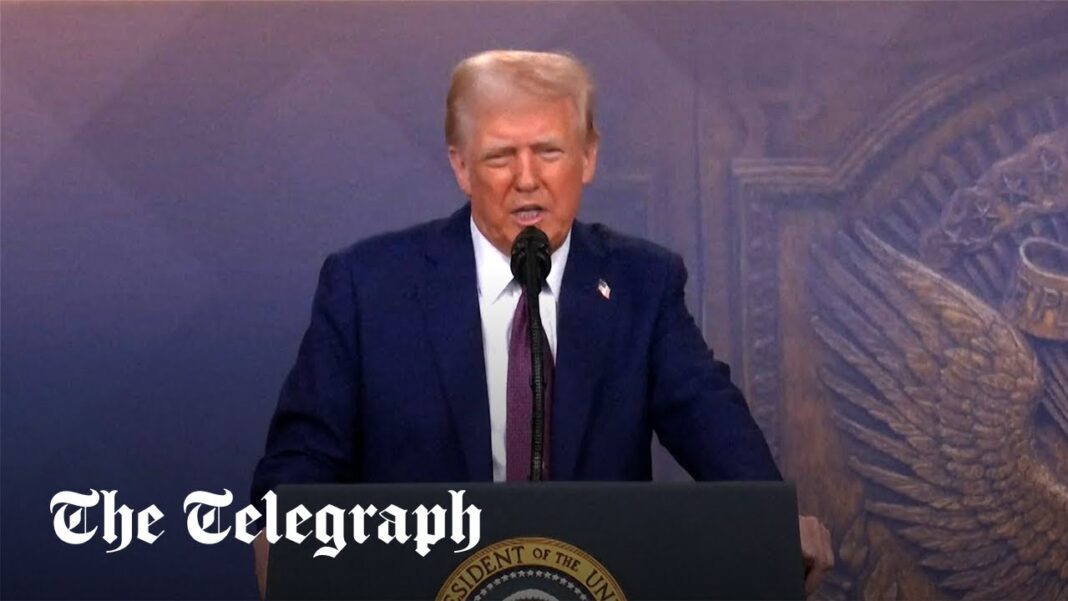|
Getting your Trinity Audio player ready...
|
Trump Pledges Massive Tax Cuts & Tariffs to Bolster U.S. Economy at World Economic Forum in Davos
Edited by: Fern Sidman
In a virtual address to the World Economic Forum in Davos, Switzerland, on Thursday, President Donald Trump outlined his ambitious economic agenda for his second term, promising unprecedented tax cuts for businesses and individuals while doubling down on tariffs to incentivize domestic production. As was reported by Fox Business, Trump framed his vision as a continuation of his administration’s efforts to make the United States the most attractive place for investment, job creation, and manufacturing in the world.
Trump’s remarks emphasized his administration’s commitment to advancing the “largest tax cut in American history.” Building on the original Trump tax cuts enacted during his first term, the president announced plans for “massive tax cuts for workers and families and big tax cuts for domestic producers and manufacturers.” Portions of the original tax reforms, including lower individual tax rates, an expanded standard deduction, and an increased child tax credit, are set to expire at the end of 2025 unless Congress acts to extend them.
“We’re working with the Democrats on getting an extension of the original Trump tax cuts, as you probably know by just reading any paper,” Trump said, according to the report on Fox Business. Beyond preserving his earlier reforms, Trump pledged even deeper tax reductions, particularly for businesses willing to manufacture in the United States. “My message to every business in the world is very simple: come make your product in America, and we will give you among the lowest taxes of any nation on Earth,” he declared.
While Trump promoted the benefits of investing in the U.S., he also issued a stern warning to businesses that choose to manufacture overseas. “If you don’t make your product in America, which is your prerogative, then very simply you will have to pay a tariff,” Trump said. According to the information provided in the Fox Business report, he proposed tariffs ranging from 10% to 20% on all imports, with specific levies targeting goods from China, Canada, and Mexico. Goods from China could face tariffs as high as 60%, reflecting Trump’s long-standing criticism of unfair trade practices by Beijing.
Trump argued that the revenue generated by these tariffs would bolster the U.S. economy, helping to pay down national debt and fund critical infrastructure projects. “Differing amounts, but a tariff, which will direct hundreds of billions of dollars and even trillions of dollars into our treasury to strengthen our economy and pay down debt,” Trump explained.
Citing recent investment deals as evidence of growing confidence in the U.S. economy, Trump highlighted several high-profile announcements. As per the information contained in the Fox Business report, he pointed to a $100 to $200 billion investment commitment from SoftBank, facilitated by his administration, and a $500 billion partnership between Oracle, SoftBank, and OpenAI to build AI infrastructure.
Additionally, Trump noted a $20 billion investment by UAE-based real estate developer DAMAC to construct data centers in the Sun Belt and Midwest regions of the United States. He also revealed that Saudi Arabia plans to invest at least $600 billion in the U.S., a figure he hopes to see increase. “I’ll be asking the crown prince — who’s a fantastic guy — to round it out to around $1 trillion,” Trump said, expressing confidence in Saudi Arabia’s willingness to deepen its economic ties with the U.S.
According to the Fox Business report, Trump’s policies have sparked renewed optimism among businesses, with several companies announcing major investments in U.S. infrastructure, technology, and manufacturing. “Other companies likewise have announced billions and billions and billions adding up to trillions of investment in America,” Trump said, positioning his administration as a driving force behind these commitments.
However, Trump’s reliance on tariffs and his withdrawal from the 2023 global corporate minimum tax agreement have drawn criticism. The tax deal, which was designed to prevent countries from engaging in a “race to the bottom” on corporate tax rates, was rejected by Trump earlier this week via executive order. He stated the agreement “has no force or effect in the United States,” signaling his preference for unilateral economic policies.
Trump closed his address with a confident assertion of his administration’s priorities: “Under the Trump administration, there will be no better place on Earth to create jobs, build factories, or grow a company than right here in the good old USA,” he told the Davos audience.
As Fox Business reported, Trump’s approach to economic policy — combining deep tax cuts, tariffs, and deregulation — seeks to solidify the U.S. as a leader in global investment and manufacturing. While his policies have sparked enthusiasm among certain sectors, they also pose challenges for global trade relations and raise questions about long-term economic impacts. As his administration moves forward, the world will be closely watching how these initiatives shape the U.S. economy and its role on the global stage.





